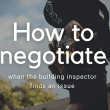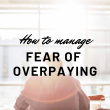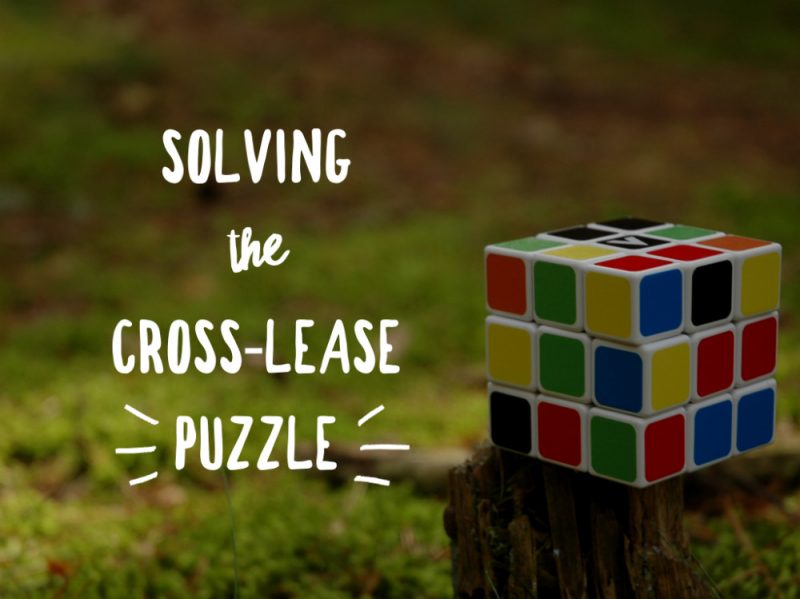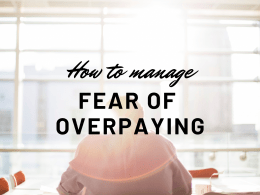I often get asked about cross-lease properties. It can be a confusing form of ownership, especially if you are new to the process of buying a home. The purpose of this article is to provide you with an understanding of whether cross-lease properties will provide a good real estate investment and/or whether you should avoid them at all costs.
Thinking of selling a cross-lease property? Head on over to relatable (our Wellington real estate agency) to request a no-obligation selling quote online…
First up – what does cross-lease mean?
The surveying company explain it well…
“A cross lease is where a number of people own an undivided share in a piece of land. The homes that they build on the land are leased from the other land-owners (normally for a term of 999 years). The houses are usually flats or townhouses.”
That might sound weird but essentially it means you own rights to a 1/2 share (or whatever fraction applies) in 1 large freehold section.
Creating a cross-lease situation was a popular (and apparently cheap) way of subdividing property in the 1970’s and 1980’s.
The surveying company’s website is worth a visit, they do an excellent job of explaining where cross-lease titles came from and the common pitfalls owners can encounter. Click here to visit their website and read the full article.
While that info might take care of explaining what a cross-lease is, it probably doesn’t answer the key question, which is:
Should you buy a cross-lease property?
Put another way – would I personally buy a cross-lease property? Yes, I would. Absolutely.
From an investment point of view, the key here is that when you own a cross-lease property, you usually own a 1/2 or 1/3rd share of a freehold section (ie. the land) which is the actual asset that goes up in value. So in that regard, you are pretty safe. Having worked in real estate since 2007, selling countless cross-lease and freehold properties, I have seen both types of properties go up in value just fine.
Cross-lease properties are usually available at the lower end of the price spectrum. A common scenario would be 2 x 3 bedroom townhouses, built in the 1970’s that are attached to each other (where you are buying one of them). Because of this, they are often attractive to first home buyers or those on a limited budget.
How common is cross-lease?
There were 3,257 total sales in Wellington City between October 2017 and September 2018.
162 of these properties were cross-lease (representing 5% of the total market) and those cross-lease houses had a median sale price of $539k (as opposed to the overall median sale price of $710k).
This is another reason why I personally favour cross-lease properties – they allow an affordable way to get into the market. Something that is all too uncommon in today’s raging hot real estate world.
This can mean that properties with this slightly less-common form of are often being bought by the least experienced buyers. When you are a first home buyer you are often highly susceptible to other’s opinions and it isn’t uncommon for those in the older generation to say things like “Don’t buy a cross-lease property!” or “You’re bound to have trouble with that!”.
Are they right to be concerned?
It depends on the situation. The negative stigma around cross-lease properties comes about when owners want to change something about their property, but struggle to get the other owners permission. An example would be – upgrading a shared driveway that has potholes (maybe the other owner doesn’t have any money to contribute to the cost of doing the work), or trying to complete an extension that the other owner won’t agree to.
People don’t like having their options limited and generally don’t like not getting their way if they can’t see a good reason for something not to work.
It’s fair to say that cross-leases work best when both properties are fairly independent and each owner doesn’t require much from the other or doesn’t plan to change their property a great deal in future.
If you are the DIY type and you can see yourself wanting to put up ‘archgolas’ or bang up a carport in your spare weekends, then cross-lease ownership probably isn’t for you.
The median number of days on the market for a cross-lease property over the past 12 months was 24, while the median sale price was +50% over RV. Both of those figures are consistent with medians for the entire market.
What does this mean? If you own a cross-lease property you don’t need to worry about it being hard to sell in future.
Important points to consider before you buy:
Is the flats plan up to date?
Each cross-lease title should have a ‘flats plan’ attached. This will look like a rough outline of the property from a ‘birds-eye view’. You should check that this outline matches what exists in reality.
If it doesn’t, this could create what is called a ‘defective title’. It’s not necessarily the end of the world but it can be pricey to fix so you will want to obtain a discount when buying a property that falls into this category. Speak to your solicitor before your offer or during negotiations to get an idea of what they feel a fair discount would be.
Does any previous renovation have Council consent (if required) and show on the flats plan?
This is a common issue – owners of a cross-lease property historically undertake a renovation, obtain council consent to do so and think everything is hunky-dory. Problem is if the renovation changes the footprint of the property and they haven’t updated the flats plan then you still potentially have a defective title, even if Council has given their permission to complete the work. This will cause issues when you come to sell the property in future if the buyers (or their lawyer) spot the discrepancy.
What does the memorandum of lease say?
Every cross-lease property should have a ‘memorandum of lease’ which describes the terms of the relationship between each owner. It is important to ask your solicitor to order this and read it through. This document will state under what circumstances you require the other owner’s consent to complete changes.
Many leases require you to ask your neighbours permission to put up a fence, change the footprint, paint your property etc. Some are a little more ‘liberal’ and don’t have many strict rules. Others will even have rules around pets so it’s critical you check this before going ahead.
Final word…
Nearly every form of property ownership requires some sort of co-operation with your neighbours. Many freehold houses have shared driveways, adjoining fences, or are in close proximity to each other. So don’t rule out a cross-lease just because you are scared of dealing with the situations. They are just part and parcel of taking part in this adult game of monopoly we call property ownership.
Where to get more info…
What is a cross-lease property? (The Survey Company)
Purchasing cross-lease – things to look out for (Home Legal)
Understanding types of real estate ownership (REA website)
More useful articles for home buyers…
Why you should be using a mortgage broker
How to make unconditional offers (if you want to)
Thinking of selling a cross-lease property? Head on over to relatable (our Wellington real estate agency) to request a no-obligation selling quote online…









